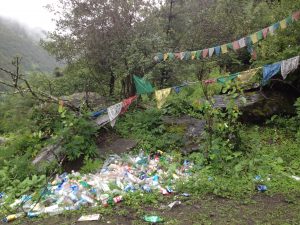Think about waste, mitigate climate change

This summer Sandra covered the Global Dialogue on Waste of non-profit organisation Be Waste Wise (missed it? Read it here). July 2016 of the Global Dialogue on Waste was dedicated to the subject of climate change. We all know that waste is harmful for the environment: plastics, for example, pose a threat to ocean life and chemicals endanger soil fertility. But when you bring your garbage bag to the bin or separate your waste, do you think about your contribution to climate change? I had a chat with WasteWise co-founder Ranjith Annepu and came to the conclusion that waste management has a great impact on climate change and the people dealing with this.

Dumped waste in China // photo: Sacha Tijmstra
What is wrong with the current waste management system?
Several aspects contribute directly, although in small percentage, to climate change. First of all, landfills, e.g. a hole in the ground and filled with waste, release methane gases. The lack of recycling, furthermore, leads to more greenhouse gas emissions. As I learned, manufacturing things out of raw materials leads to more emissions than using recycled materials, and obviously, simply reusing goods would mean no extra emissions at all. Don’t forget about recycling paper either: this leaves more trees standing, so they can suck in all that CO2 we bring into the world, otherwise known as carbon sequestration.
Second, bad waste management aggravates the consequences of climate change. Think of plastic waste in streams and sewers: because the excess water- due to heavy precipitation, which is a consequence of climate change- has nowhere to go, floods happen more easily.

The plastic bottle curse // photo: Sacha Tijmstra
Improper waste management also makes the people in this world, who are already prone to the consequences of climate change, even more vulnerable to health risks. Sick people are less able to cope with the consequences of climate change, like environmental disasters and forced migrations.
The burning of waste, which is the main way of dealing with waste in many countries, causes health issues. Moreover, water collected in waste litter is a breeding ground for mosquitoes carrying diseases, like malaria. Since temperatures are rising due to global warming, this is becoming more prevalent. This way we can also conclude that climate change aggravates the consequences of bad waste management.
[perfectpullquote align=”full” cite=”” link=”” color=”” class=”” size=””]Better waste management can lead to behaviour change to reduce today’s high consumption patterns worldwide[/perfectpullquote]
Better waste management = mitigating climate change
It becomes clear that improvement is definitely needed. If waste management is executed well, it not only deals with the direct consequences of waste (e.g. more recycling, reusing, etc.) but can also lead to behaviour change to reduce today’s high consumption patterns worldwide. Since 42% of all emissions have to do with consumption, this can lead to a great decrease in emissions and help mitigate the consequences of climate change. If, for example, you stop throwing away food, you might start thinking about buying less food.
[perfectpullquote align=”right” cite=”” link=”” color=”” class=”” size=””]By becoming aware of the consequences of our actions we become aware of our actions.[/perfectpullquote]Or when you struggle to find a place to recycle your cheap and broken mp3 – once every year – you might want to find a more durable one. When we start realizing what we throw away and what effort we need to take to reuse or recycle things, we start realizing what we buy as well. It is then by becoming aware of the consequences of our actions that we start to become aware of our actions.
Want to know what the future holds? Follow be Waste Wise, and read up on September’s theme: the future of waste.
Ranjith Annepu is a Co-Founder and Curator of be Waste Wise. He is a consultant for the World Bank and the India Coordinator for Columbia University’s Global Waste-to-Energy Research and Technology (WTERT) Council. (source: be Waste Wise)

[…] Start with this general introduction to Solid Waste Management and Climate Change and the debate about various technologies and their role in mitigating climate change. Also read this general overview of how climate change and waste are connected by Thinking About Waste, Mitigating Climate Change. […]